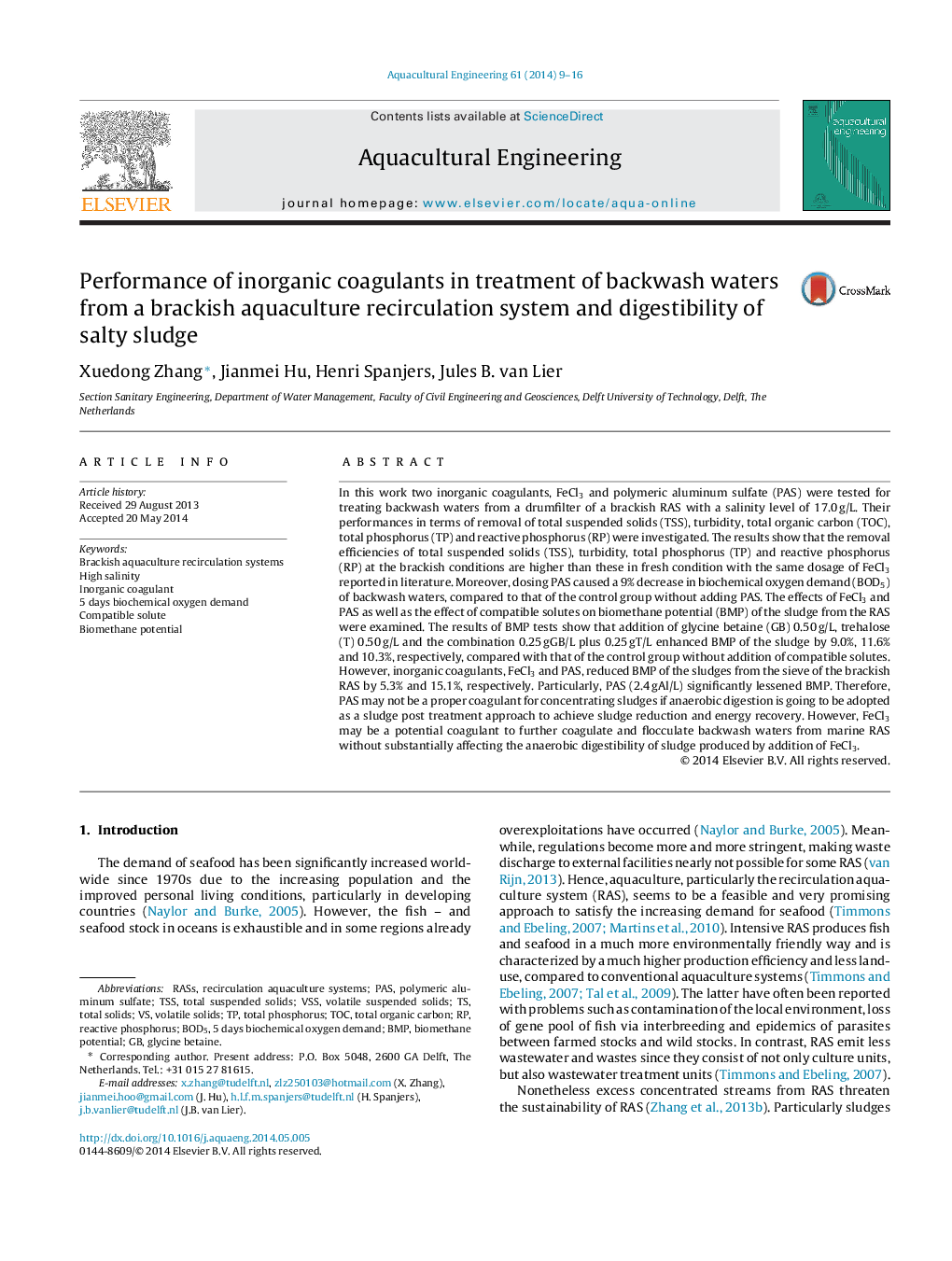| کد مقاله | کد نشریه | سال انتشار | مقاله انگلیسی | نسخه تمام متن |
|---|---|---|---|---|
| 6381277 | 1625709 | 2014 | 8 صفحه PDF | دانلود رایگان |
عنوان انگلیسی مقاله ISI
Performance of inorganic coagulants in treatment of backwash waters from a brackish aquaculture recirculation system and digestibility of salty sludge
ترجمه فارسی عنوان
عملکرد کلاژنهای معدنی در درمان آبهای عقب مانده از یک سیستم گردش خون آبزی پروری و قابلیت هضم لجن شور
دانلود مقاله + سفارش ترجمه
دانلود مقاله ISI انگلیسی
رایگان برای ایرانیان
کلمات کلیدی
TSSreactive phosphorusRASSBOD5TOCVSs - VSSTotal solids - جامدات جامدvolatile solids - جامدات فرارCompatible solute - حل سازگارRecirculation aquaculture systems - سیستم های آبزی پرورش گردش خونHigh salinity - شوری بالاtotal suspended solids - مجموع مواد جامد معلقBMP - مدیریت فرایند کسب و کارVolatile suspended solids - مواد جامد معلق دائمیPAS - نهBiomethane potential - پتانسیل بیومتریTotal phosphorus - کل فسفرTotal organic carbon - کل کربن آلیGlycine betaine - گلیسین بتائین
موضوعات مرتبط
علوم زیستی و بیوفناوری
علوم کشاورزی و بیولوژیک
علوم آبزیان
چکیده انگلیسی
In this work two inorganic coagulants, FeCl3 and polymeric aluminum sulfate (PAS) were tested for treating backwash waters from a drumfilter of a brackish RAS with a salinity level of 17.0Â g/L. Their performances in terms of removal of total suspended solids (TSS), turbidity, total organic carbon (TOC), total phosphorus (TP) and reactive phosphorus (RP) were investigated. The results show that the removal efficiencies of total suspended solids (TSS), turbidity, total phosphorus (TP) and reactive phosphorus (RP) at the brackish conditions are higher than these in fresh condition with the same dosage of FeCl3 reported in literature. Moreover, dosing PAS caused a 9% decrease in biochemical oxygen demand (BOD5) of backwash waters, compared to that of the control group without adding PAS. The effects of FeCl3 and PAS as well as the effect of compatible solutes on biomethane potential (BMP) of the sludge from the RAS were examined. The results of BMP tests show that addition of glycine betaine (GB) 0.50Â g/L, trehalose (T) 0.50Â g/L and the combination 0.25Â gGB/L plus 0.25Â gT/L enhanced BMP of the sludge by 9.0%, 11.6% and 10.3%, respectively, compared with that of the control group without addition of compatible solutes. However, inorganic coagulants, FeCl3 and PAS, reduced BMP of the sludges from the sieve of the brackish RAS by 5.3% and 15.1%, respectively. Particularly, PAS (2.4Â gAl/L) significantly lessened BMP. Therefore, PAS may not be a proper coagulant for concentrating sludges if anaerobic digestion is going to be adopted as a sludge post treatment approach to achieve sludge reduction and energy recovery. However, FeCl3 may be a potential coagulant to further coagulate and flocculate backwash waters from marine RAS without substantially affecting the anaerobic digestibility of sludge produced by addition of FeCl3.
ناشر
Database: Elsevier - ScienceDirect (ساینس دایرکت)
Journal: Aquacultural Engineering - Volume 61, July 2014, Pages 9-16
Journal: Aquacultural Engineering - Volume 61, July 2014, Pages 9-16
نویسندگان
Xuedong Zhang, Jianmei Hu, Henri Spanjers, Jules B. van Lier,
